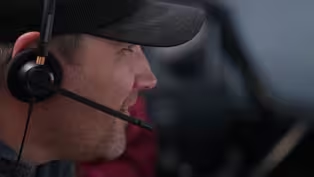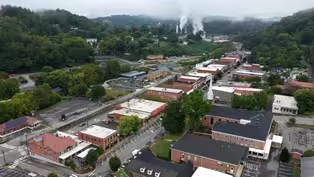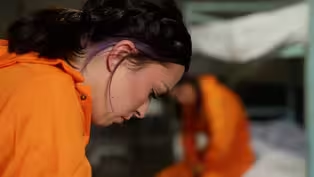
How Alternative Policing in Rural America Could Work
Clip: 2/21/2025 | 8m 16sVideo has Closed Captions
Small towns reshape their crisis response. Are social workers the future of public safety?
Step inside a radical shift in public safety: social workers on the front lines of crisis response. Discover how small towns in North Carolina are transforming their approach to mental health emergencies, homelessness and low-level crimes. As communities across America question traditional policing, we explore innovative alternatives that are reshaping how cities respond to those in crisis.
Problems playing video? | Closed Captioning Feedback
Problems playing video? | Closed Captioning Feedback
ncIMPACT is a local public television program presented by PBS NC

How Alternative Policing in Rural America Could Work
Clip: 2/21/2025 | 8m 16sVideo has Closed Captions
Step inside a radical shift in public safety: social workers on the front lines of crisis response. Discover how small towns in North Carolina are transforming their approach to mental health emergencies, homelessness and low-level crimes. As communities across America question traditional policing, we explore innovative alternatives that are reshaping how cities respond to those in crisis.
Problems playing video? | Closed Captioning Feedback
How to Watch ncIMPACT
ncIMPACT is available to stream on pbs.org and the free PBS App, available on iPhone, Apple TV, Android TV, Android smartphones, Amazon Fire TV, Amazon Fire Tablet, Roku, Samsung Smart TV, and Vizio.
Providing Support for PBS.org
Learn Moreabout PBS online sponsorship- What if when you called 911 in crisis, the person who responded wasn't a police officer but a social worker?
This is happening in some parts of North Carolina.
- I'm gonna be out with individuals at Poteet Park.
- You see, about 20% of 911 calls involve a mental health or substance use crisis.
But across America, we're wrestling with a hard truth.
Our police often aren't equipped to handle mental health emergencies.
So what happens?
Well, often people end up arrested, or worse.
This means that about half of the prison population in North Carolina needs mental health treatment, and that overburdens a criminal justice system that's not designed for patient care.
But what if we could change that?
What if we could reimagine what crisis response looks like?
That's what they're doing here in Sylva, North Carolina.
- I got to see firsthand some of the best police work I've ever seen done by an intern.
- In this video, we'll ride along with a social worker as she responds to a call about a homeless couple in crisis, giving us a rare look at how these encounters really unfold.
We'll find out, is this partnership between police and social workers the key to safer communities or is it just a temporary fix to a solution that runs deeper?
I'm David Hurst.
This is "ncIMPACT."
[upbeat music] [protesters shouting] In the summer of 2020, protests erupted nationwide following George Floyd's murder.
A crucial conversation about policing in America was taking center stage.
How tough was policing during that time?
- Policing in 2020 was...
I've been doing this for about 27 years and that was definitely the most challenging time.
- [David] The calls for change were clear.
Communities wanted alternatives to armed officers responding to every crisis.
But what could a small town deep in the mountains of North Carolina do about it?
It's a challenge facing 90% of America's police departments, small forces with fewer than 15 officers.
- A lot of the models that we were able to find when we looked across the country are in large cities.
You can't pick it up from Raleigh and drop it in Sylva and expect it to work the same way.
- [David] Without big city budgets, they needed a different solution.
That's when two Western Carolina University professors saw an opportunity.
Katy Allen from social work and Cyndy Caravelis from criminal justice had a simple but radical idea.
What if they placed social work interns directly within the police department?
When Sylva's police chief first heard the idea, he liked it but was skeptical with co-responding, that means sending students along with police officers to crisis situations.
- When the program first started, I was pretty serious about no co-responding.
I just thought that was not a good use of time and saw some problems with that.
But what happened is our intern ended up wanting to do a ride-along to learn more about the police officers and why they do what they do.
I got to see firsthand some of the best police work I've ever seen done by an intern, a social work intern.
- [David] And that experience changed everything.
It also came at a time when Chief Hatton was realizing how few options his officers had when responding to crisis calls.
- Like I said, our officers, we have jail.
That's what we're given to handle problems.
That's not very effective tools because if somebody, if mental illness is the core problem, then jail's not gonna help that.
- [David] So in October of 2021, Sylva launched the Community Care Program, - SP20 county.
- The concept was simple.
Place social work interns from Western Carolina inside the police department to serve as a bridge between law enforcement and social services.
These interns could ride along on calls and offer immediate support when officers needed it.
But unlike police work, which often ends when the crisis is contained, the social workers keep going, following up with individuals and connecting them to resources.
Galadriel LaVere started as one of these interns.
Now, as the department's full-time Community Care coordinator, she can respond to calls on her own.
When you respond, or even when you first responded, what was the response from these folks when you would show up rather than a police officer?
- It was mixed.
I think initially there was skepticism, but now just through word of mouth and the people that I work with, a lot of people are interested in figuring out how I can help.
- [David] While we're chatting with Galadriel, she got a call, so we hopped in to see the program in action.
- [Galadriel] I've been called to Dillsboro Road.
There's a couple there.
They are in need of transportation.
They've got some health issues going on and are experiencing homelessness.
- So someone called 911 saying they were there, police responded first- - Yes.
- They thought it'd be good for you to come out?
- [Galadriel] Yes.
I mean, basically it's a, it's a 10-60 call, suspicious people, because due to her health considerations, she has to sit down a lot.
So they were sitting on somebody's property, which is why they called 911.
- Hello.
- So, who?
[censored] Oh, I remember them.
- This is the one from Sunday.
- Yeah, did you talk to them at Mark Watson?
- [Galadriel] I didn't, but I've heard their names a while ago.
- Yeah.
She went to the hospital.
- Okay, where is- - Sunday.
They're over there.
- They're over there.
- Hey, how you doing?
- Hey, good, how are you?
- Well, this is Galadriel.
- [Client] She won't be able to stand long.
- [Galadriel] Oh, she doesn't have to stand up.
I can come over here.
- Okay.
- I can come over here.
- All right.
Yeah, it don't matter wherever it is 'cause, you guys, we just need to get to Waynesville, go to that shelter, talk to them, call some people on wifi and then try to, you know, they had that wifi, and try to, you know, get back home.
You know, it's as simple as we wanna make it.
[chuckles] - [Galadriel] Remind them I said like around three o'clock.
- Okay.
- Okay.
- [David] From this call alone, we can see the complex challenges Galadriel faces daily.
She managed to find transportation for her clients this time, but it's likely a temporary fix to a deeper problem.
- The majority of my clients, you kinda have the trifecta of homelessness, substance use, and mental health disorders.
- Okay.
- And there's usually at least two of those at play.
- [David] And this is where rural communities like Sylva face their biggest hurdles.
There's no homeless shelter, no mental health facility, and no addiction treatment center.
- So, in our community, and in many rural communities, people are willing to receive treatment and help, but we don't have anywhere to send them.
- [David] These gaps in rural infrastructure could have derailed the entire program.
Instead, it forced innovation.
The focus shifted from just handling emergencies to preventing them in the first place.
They created a network across neighboring counties, connecting people to resources like shelters, treatment centers, and food assistance programs in surrounding areas.
- I think as we continue to do this and have people working and really caring about these populations, that it will open other people's eyes to the holes in care that exist because they're big.
- [David] The program now operates in seven police departments across Western North Carolina, with four more waiting to join.
But program leaders say success in one town doesn't guarantee it will work in another.
- This is not a magic bullet.
This is not "we will provide you with a social worker and all of your problems will be solved."
This is a slow growth model.
- [David] So across North Carolina, communities are finding their own ways to reimagine crisis response.
In Jacksonville, the Dix Crisis Center offers an alternative to jails and emergency rooms.
In Hickory, police partner with social services through the LEAD program.
It helps people access care instead of moving straight to punishment.
But even still, challenges remain.
Rural communities still face significant gaps in mental health care, housing, and addiction treatment.
For Chief Hatton, who was once skeptical about letting social workers ride along, now there's no going back.
- I have no intentions of ever being a police chief anywhere else, but this for me would be, that would be a deal-breaker for me, like either we have a social worker or we're going to get a social worker.
I wouldn't wanna do this job, not without one.
[soft music] - [David] For "ncIMPACT," I'm David Hurst.
Fixing the Emergency Call Staffing Shortage
Video has Closed Captions
Clip: 2/21/2025 | 5m 54s | 911 centers face a critical dispatcher shortage as cities rush to staff emergency lines. (5m 54s)
Video has Closed Captions
Preview: 2/21/2025 | 20s | As public safety needs evolve, communities pioneer creative solutions to protect their residents. (20s)
Rural Communities Are Rethinking Women's Incarceration
Video has Closed Captions
Clip: 2/21/2025 | 8m 25s | Rural communities are adapting as more women return home from prison. (8m 25s)
Providing Support for PBS.org
Learn Moreabout PBS online sponsorship
- News and Public Affairs

Top journalists deliver compelling original analysis of the hour's headlines.

- News and Public Affairs

FRONTLINE is investigative journalism that questions, explains and changes our world.












Support for PBS provided by:
ncIMPACT is a local public television program presented by PBS NC


